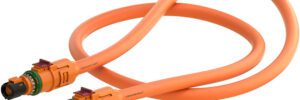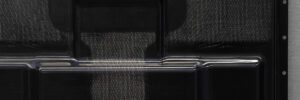
Cable and connector specialist HUBER+SUHNER has been making significant investments in its in-house production capability, and has expanded its high-voltage portfolio to deliver complete cable assemblies to customers.
The company has launched a new purpose-built high-voltage modular cable assembly (mCAY). The solution has been designed to be simpler to assemble and to save development efforts and time for manufacturers of commercial EVs such as trucks, buses and specialty vehicles. End-of-line testing is included within the assembly process, so once the mCAY solution has been assembled and tested together, the customer can install it immediately in commercial EVs.
“Many vehicle manufacturers focus on the direct costs of their solutions, without paying enough attention to indirect production costs such as assembly, test and production equipment,” says the company. “These costs can be significantly reduced by considering requirements from production, and through the application of a modular approach, rather than a product-by-product approach.”
HUBER+SUHNER is also launching a product configurator that allows customers to tailor products to their exact specifications. The WEB enables users to mix and match cables, connectors and glands in just a few clicks. With options for numerous cable sizes and types (single-core, multi-core or flex), an mCAY can be customized through the configuration software.
HUBER+SUHNER’s modular cable assemblies have been designed to be fully compatible with other products in the company’s high-voltage portfolio, including RADOX cables, the modular High-Voltage Distribution Unit (mHVDU) and the RADOX EV-C connection system.
“Our partnerships with major connector manufacturers ensure our engineers remain up to date with the latest solutions. We then use our team’s experience with these technologies to deliver ready-to-use assemblies perfect for our customers’ requirements,” said Senior Product Manager Robert Weirauch. “As high-voltage cable and connector technologies grow in complexity, so too does the assembly process. If manufacturers lack the technical knowledge, experience, or tools required to assemble these critical parts, it could result in avoidable errors and a slow time to market for their EVs.”
Source: HUBER+SUHNER
from Charged EVs https://ift.tt/jmsOxSF


No comments:
Post a Comment